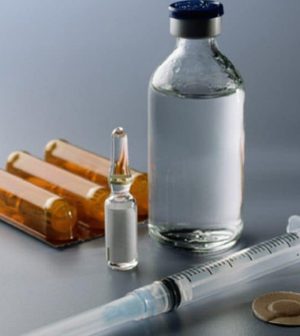- Could Your Grocery Store Meat Be Causing Recurring UTIs?
- Are You Making This Expensive Thermostat Error This Winter?
- Recognizing the Signs of Hypothyroidism
- 10 Strategies to Overcome Insomnia
- Could Artificial Sweeteners Be Aging the Brain Faster?
- Techniques for Soothing Your Nervous System
- Does the Water in Your House Smell Funny? Here’s Why
- Can a Daily Dose of Apple Cider Vinegar Actually Aid Weight Loss?
- 6 Health Beverages That Can Actually Spike Your Blood Sugar
- Treatment Options for Social Anxiety Disorder
Catch-Up HPV Shots Work for Teen Girls

Human papillomavirus (HPV) vaccinations are effective for teen girls who didn’t get the recommended shots when they were 11 or 12, researchers report.
The Kaiser Permanente study of more than 25,000 women aged 26 and younger found that those who got all three doses of the vaccinations between ages 14 and 20 were protected against the virus that is spread through sexual contact and could lead to cervical cancer.
In the United States, HPV vaccination is recommended for girls aged 11-12. For those who did not receive the vaccine at this age, catch-up vaccination has been recommended between ages 13 and 26.
However, less than half of girls aged 13 to 17 are up to date with the HPV vaccine series.
The latest findings suggest that getting the full three-dose series between ages 14 and 20 is effective. But, the researchers added, further study is needed to confirm the effectiveness of catch-up vaccination in women between the ages of 21 and 26.
The study was published Aug. 7 in The Lancet Child & Adolescent Health journal.
“The evidence suggests that protection is strongest the earlier the vaccine is initiated, and after the age of 21, the evidence of effectiveness is unclear. Further research in other settings, and using the recently introduced nonavalent vaccine, will now be needed to assess the effectiveness of vaccinating women aged 21 to 26,” study author Michael Silverberg said in a journal news release. He is a research scientist with Kaiser Permanente Northern California’s Division of Research in Oakland.
“The results of this study confirm existing research, which showed that the HPV vaccine is most effective when given at younger ages, but no benefit was found in patients older than 21 years,” Sarah Dilley and Warner Huh, from the University of Alabama at Birmingham, wrote in an accompanying editorial.
“Efforts towards increasing HPV vaccine uptake should be focused on younger adolescents — with a priority on vaccinating children aged 11-12 years — and providing catch-up dosing for older adolescents,” they added.
“However, in the setting of low rates of HPV vaccination in the USA, the importance of catch-up dosing in young women should not be ignored. Given that prospective efficacy studies have shown benefits for catch-up vaccination up to at least age 26 years, more data is needed before abandoning this practice,” they concluded.
More information
The U.S. Centers for Disease Control and Prevention has more on HPV.
Source: HealthDay
Copyright © 2026 HealthDay. All rights reserved.










